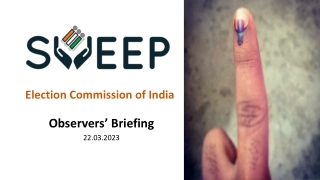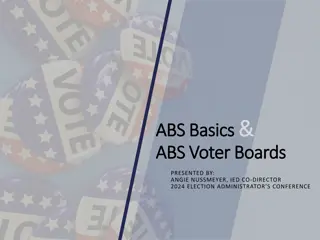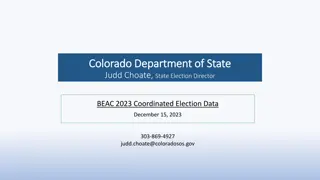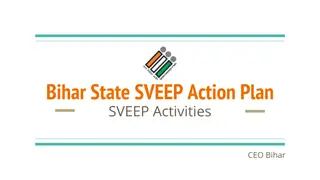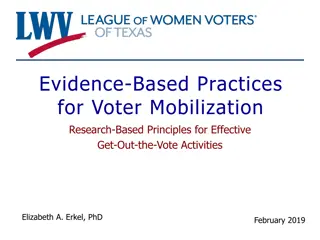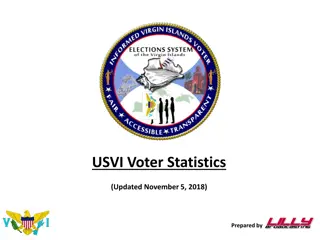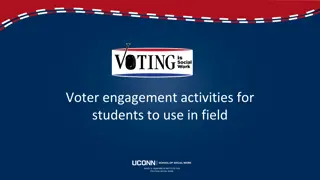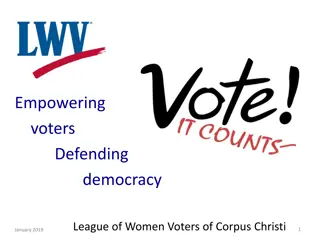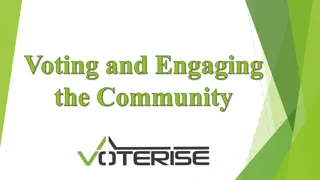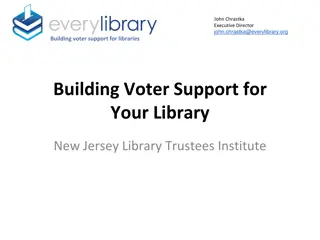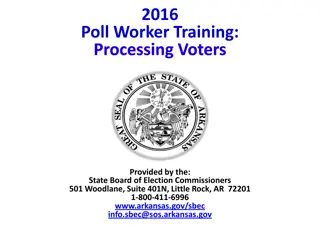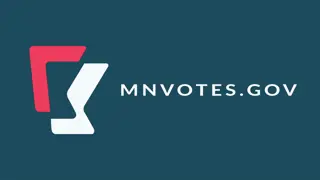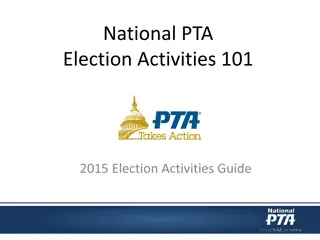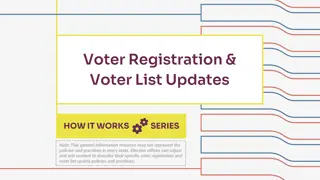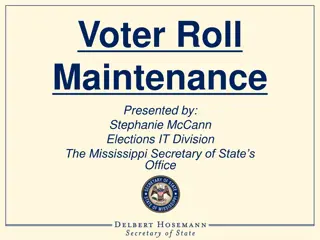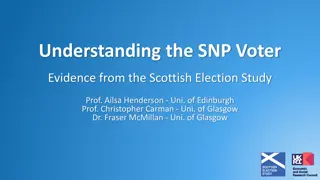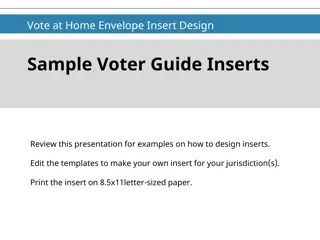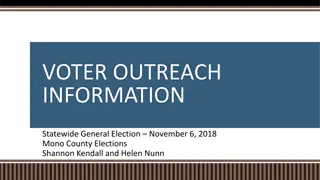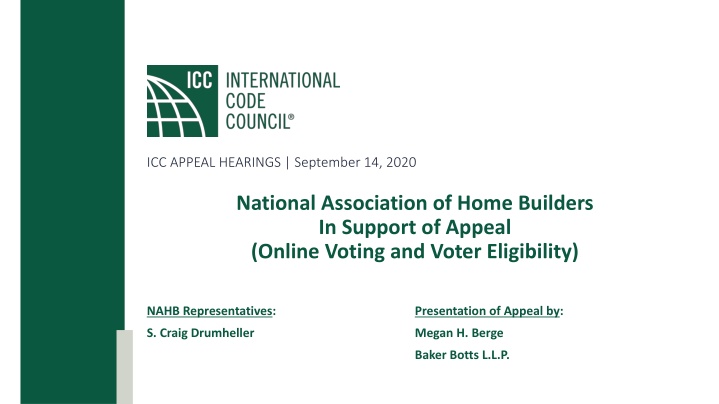
ICC Appeal Hearings on Online Voting Issues - Summary and Analysis
In the ICC appeal hearings, the National Association of Home Builders raised concerns about voting irregularities and broad eligibility criteria in the Online Governmental Consensus Vote. The presentation overview covered the scope of review by the Board of Appeals, ICC Board's authority, and duty in addressing voting irregularities. The summary of issues highlighted challenges in the 2019 Group B Code Development Cycle. The eligibility criteria for the Online Governmental Consensus Vote were deemed too broad.
Download Presentation

Please find below an Image/Link to download the presentation.
The content on the website is provided AS IS for your information and personal use only. It may not be sold, licensed, or shared on other websites without obtaining consent from the author. If you encounter any issues during the download, it is possible that the publisher has removed the file from their server.
You are allowed to download the files provided on this website for personal or commercial use, subject to the condition that they are used lawfully. All files are the property of their respective owners.
The content on the website is provided AS IS for your information and personal use only. It may not be sold, licensed, or shared on other websites without obtaining consent from the author.
E N D
Presentation Transcript
ICC APPEAL HEARINGS | September 14, 2020 National Association of Home Builders In Support of Appeal (Online Voting and Voter Eligibility) NAHB Representatives: Presentation of Appeal by: S. Craig Drumheller Megan H. Berge Baker Botts L.L.P.
/ec3300/e /ec3300/e Presentation Overview Board of Appeals Review ICC Board Authority and Duty Summary of Issues Online Voting & Voter Eligibility Impacts on 2019 Group B Code Development Cycle Procedural Implications Requested Remedies
/ec3300/e /ec3300/e Board of Appeals Review Scope of Review (6.3.7): Includes matters of process and procedure Excludes decisions on the relative merits of technical matters Basis for Action (6.3.8): Any material and significant irregularity of process or procedure Allowed Actions (6.3.9): Board of Appeals may fashion any remedy it deems appropriate
/ec3300/e /ec3300/e ICC Board Authority and Duty Voting Irregularities (10.2): Where voting irregularities or other concerns with the Online Governmental Consensus Voting process which are material to the outcome or the disposition of a code change proposal(s) are identified by the validation committee, such irregularities or concerns shall be immediately brought to the attention of the ICC Board. The ICC Board shall take whatever action necessary to ensure a fair and impartial Final Action vote on all code change proposals . . . . ICC Board Action (13.1): [T]he ICC Board may take any actions it deems necessary to maintain the integrity of the code development process.
Summary of Issues 1. The eligibility criteria for participating in the Online Governmental Consensus Vote ( OGCV ) are too broad. 2. The 2019 Group B Code Development Cycle included voting irregularities and other concerns that were material.
The eligibility criteria for participating in the OGCV are too broad.
/ec3300/e /ec3300/e The OGCV Eligibility Criteria Are Too Broad ICC Bylaws on Governmental Member (2.1.1): A Governmental Member shall be a governmental unit, department or agency engaged in the administration, formulation, implementation or enforcement of laws, ordinances, rules or regulations relating to the public health, safety and welfare. ICC Bylaws on Governmental Member Voting Representatives (2.1.1.1): Governmental Member Voting Representatives shall be . . . employees or officials of the Governmental Member or departments of the Governmental Member, provided that each of the designated voting representatives shall be an employee or a public official actively engaged either full or part time, in the administration, formulation, implementation or enforcement of laws, ordinances, rules or regulations relating to the public health, safety and welfare. Can you think of a governmental function that does not implicate public health, safety, or welfare?
Overbroad OGCV Eligibility Criteria Conflict With ANSI U.S. Standards Strategy CP#28-05, Section 1.4 (Process Maintenance): The manner in which Codes are developed embodies core principles of the organization. ICC 2019 Report: The International Code Council s code development process is consensus-based and founded on principles of due process and transparency, and meets the principles defined by the National Standards Strategy of 2000. ANSI s U.S. Standards Strategy: Globally accepted principles of standards development must include: Transparency- Essential information regarding standardization activities is accessible to all interested parties. Impartiality- No one interest should dominate the process or be favored over another. Consensus- Decisions are reached through consensus through those affected. Due Process- All views must be considered
Overbroad OGCV Eligibility Criteria Conflict With ICC Core Principles Openness & Transparency Recruiters can monopolize influence over undisclosed voting representatives Participants have limited/no opportunity to influence these persons Balance of Interests (Impartiality) ICC code development committees provide a balance of interests OGCV recruitment eliminates this balance (both from the type of governmental unit they represent and geographically) Due Process Proposals that are not fully vetted in the Public Comment Hearing can continue in the process. Lack of equal access to voting representitives The International Codes are to be: Efficient and effective, economically viable and practical, and not influenced by vested financial interests OGCV allows supermajority to bypass these and other principles Source
An Easy Recruitment Contest Department of A Department of B Interest Group Mayor Department of C Department of D Department of E
Not a Hypothetical Scenario Boston: City Council Climate & Energy Department Inspectional Services Department Planning & Development Agency Public Facilities Department Public Works Department Water and Sewer Commission Newton: City Council Inspection Services Planning Department Planning Board Public Buildings Department Zoning Board of Appeals Design Review Committee Designer Selection Committee and Sustainability Citizens Commission on Energy
Imbalanced Recruitment Imbalanced Recruitment
Unintended Consequences Allows for persons without knowledge or experience with building energy codes to influence (if not dictate) outcomes Transforms an informed process that produces feasible model code provisions into a recruitment contest Invites the adoption of radical versus rational code change proposals
Yes, the Bylaws Definitions Have Been Around for a While In the past, necessary participation in multiday hearings provided a self-correcting process. Persons participating were: Vested members Frequent users of the code Those who understood the relevance of the proposed requirements Present for the hearing discussions Past process ensured: Subject knowledge and expertise Actual deliberation exchange and scrutinizing of ideas Informed decision-making People who used the codes decided on the codes
The 2019 Group B Code Development Cycle included voting irregularities and other concerns that were material.
20 Code Change Proposals Twenty proposals were disapproved twice Committee Action Hearing Public Comment Hearing Still passed because of supermajority override Included RE126 (serious legal concerns due to preemption) Included CE217 Part II and RE147 (exceeds IECC scope and intent) With a supermajority voting bloc, there is no need to have hearings at all.
ICC Report on the Code Development Process 2019 Group B Cycle A staff review of the OGCV since its inception in 2014 has confirmed that the pattern of voting identified in the letter as an irregularity disapproved at the CAH, disapproved at the PCH, then passed during the OGCV has not occurred previous to this current cycle. Report concluded that no impermissible voting irregularities occurred because pattern of voting [was] not prohibited in CP 28, and is provided for in Section 8.1. Report interpreted CP#28-05, Section 10.2 too narrowly. A voting irregularity or other concerns that are material to sustain an appeal may exist even where technical compliance occurred. Source
Objective Evidence of Material Voting Irregularities Inexperienced voters participating Massive increase in voting representative applications Large number of last-minute applications Widespread use of a single voter guide Inflammatory and over-simplified descriptions in voter guide No requirement to be knowledgeable or involved in the weeks-long technical code development process Confirmed unprecedented and anomalous voting results
Procedural Implications Under CP #28 Procedural Implications Under CP #28- -05 05 Voting Irregularities (10.2): Where voting irregularities or other concerns with the Online Governmental Consensus Voting process which are material to the outcome or the disposition of a code change proposal(s) are identified by the validation committee, such irregularities or concerns shall be immediately brought to the attention of the ICC Board. The ICC Board shall take whatever action necessary to ensure a fair and impartial Final Action vote on all code change proposals . . . ICC Board Action on Violations (13.1): Additionally, the ICC Board may take any actions it deems necessary to maintain the integrity of the code development process.
Requested Remedies: Requested Remedies: Steps to a Credible Model Code Steps to a Credible Model Code 1. Set aside the voting results of the 20 code change proposals 2. Revise CP#28-05 Clarify that proposals disapproved at both Committee Action Hearing and Public Comment Hearing cannot be overturned by the OGCV 3. Revise the Bylaws Adopt sensible limits in the definitions to prevent recruitment races Potentially limit voting to those who apply the building codes 4. Any action that the ICC Board deems necessary to maintain the model code s credibility A code development process that is driven by expertise

